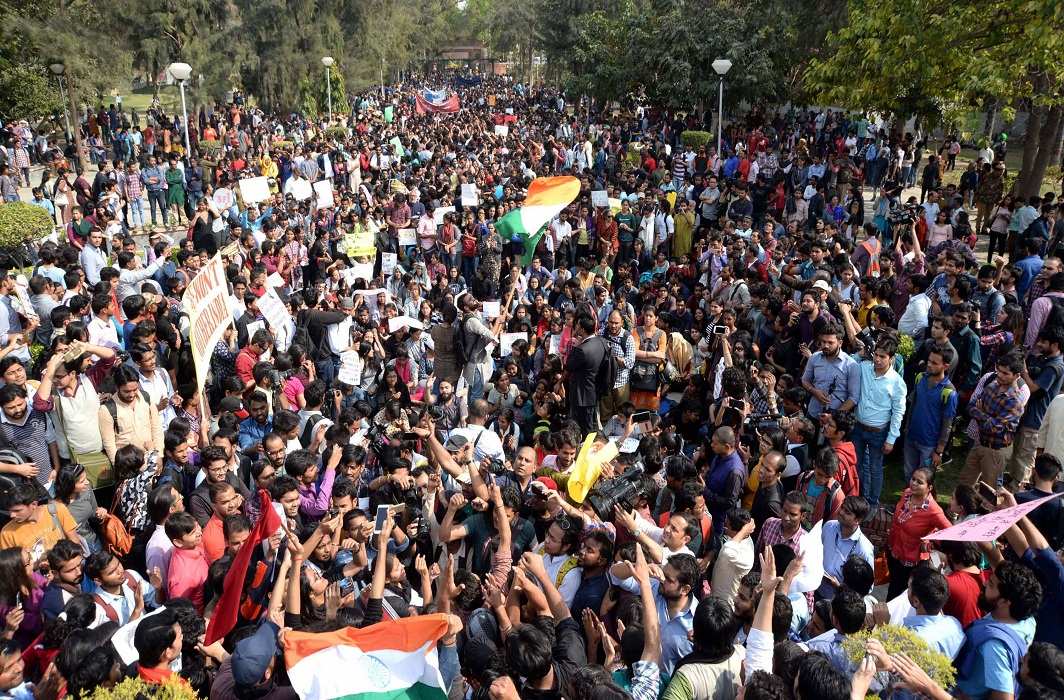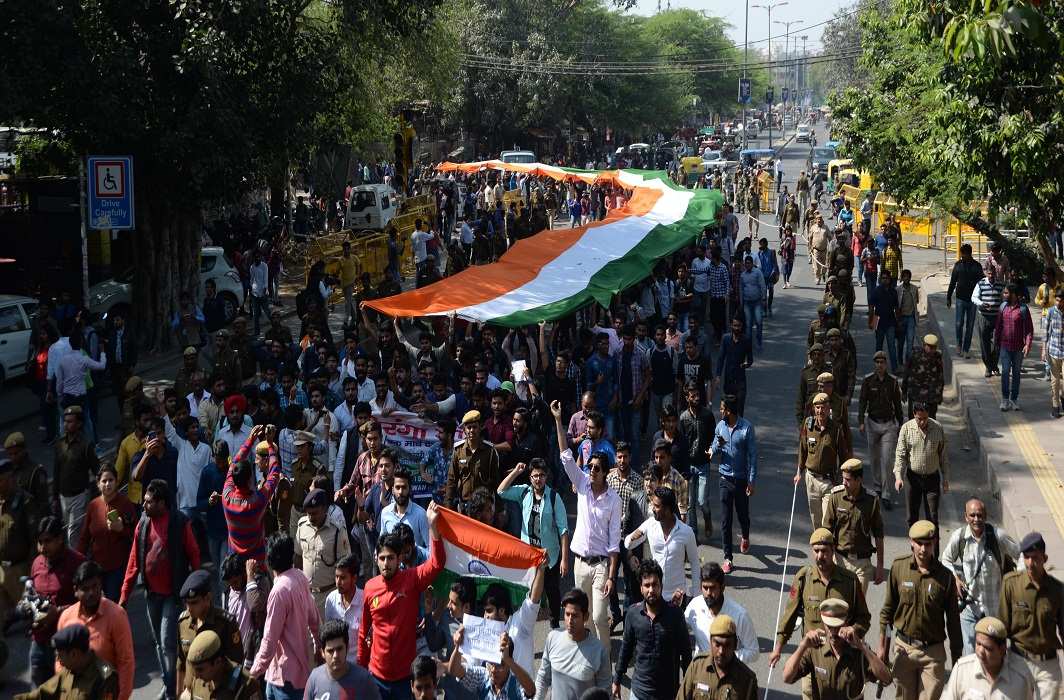
As the ABVP tries to flex its muscle on yet another campus, students and rival unions clash violently. Freedom of speech is again becoming a prime issue
~By Karan Kaushik
Delhi University has become a seething cauldron. As protests and counter-protests by students and teachers hit this iconic campus over curbs on free speech, one is reminded of similar protests in other universities in the country since last year, be it JNU, Hyderabad University or IIT-Chennai.
This growing intolerance was evident around a year-and-a-half ago when the Akhil Bhartiya Vidyarthi Parishad (ABVP), the student wing of the RSS, assaulted students and teachers and disrupted the screening of the film, Muzzaffarnagar Baaki Hai, organised by Kirori Mal College. A few months later, it declared a play of Khalsa College’s theatre society, Ankur, as anti-Hindu and got it banned.
The union also disrupted a public meeting on Bhagat Singh’s martyrdom day on March 23, 2016, in front of the Arts Faculty of Delhi University by attacking the speakers.
This sad state of affairs was evident on February 21 at Ramjas College where its English Department had organised a two-day seminar on “Cultures of Protest”, aimed at exploring various representations of dissent in the society. In one of its sessions, Umar Khalid, a research scholar of JNU named in a sedition case last year along with Kanhaiya Kumar for allegedly raising anti-national slogans against Afzal Guru’s hanging, was invited to speak on “War in Adivasi Areas”. This led to the ABVP protest and Khalid giving the seminar a miss. However, other speakers continued to speak.

But what followed was shameful. The ABVP locked students and teachers inside the seminar room and started throwing stones at them, injuring many. All this happened in the presence of the Delhi Police.
There were reports of the how ABVP members felt proud after disrupting the seminar at Ramjas.
The Wire quoted a DU student describing an ABVP member’s gloating: “As this student began describing all that had happened in Ramjas College, I was shocked to hear his open and boastful admission about how he and his friends had destroyed college property, thrashed other students and Delhi University professors, and pelted stones at them as well. Among other things he said, ‘Agar Umar Khalid aa jaata to zinda wapas nahi jata yahan se (If Umar Khalid had come to Ramjas College, he would not have gone back alive.)’ He narrated the sequence of events with such clarity and precision that whatever little doubt I had of his being a second-hand account, quickly transformed itself into the awareness that what I was hearing was an authentic confession. He was clearly excited and proud of what he had done.”
Umar Khalid, a research scholar of JNU named in a sedition case last year along with Kanhaiya Kumar for allegedly raising anti-national slogans against Afzal Guru’s hanging, was invited to speak on “War in Adivasi Areas”. This led to the ABVP protest and Khalid giving the seminar a miss. However, other speakers continued to speak.
The report further added: “This conversation provides an insight into how a student becomes a member of a violent mob, and the kind of prejudices that organisations like the ABVP both mobilise and reinforce. It also reveals the confidence that comes with being on the same side as the ruling party, in particular the knowledge that the police will not act against you.”
As the University erupted, students of Delhi University united with those in Ramjas and organised a protest march. But stones were pelted at them and teachers by the ABVP, some were thrashed even as the police remained mute spectators. Female students were abused and physically assaulted as eggs and shoes were thrown at them. During the vandalising, the ABVP did not forget to raise slogans of “Bharat Mata Ki Jai”.
Prez hits out at throttling of free speech
President Pranab Mukherjee severely criticised the fracas at Delhi University when he said during a speech on March 2: “There must be space for legitimate criticism and dissent… There should be no room in India for the intolerant Indian.”
The President made it clear that “…universities must engage in reasoned discussion and debate rather than propagate a culture of unrest.” He talked about free thinking and hit the nail on the head when he said he would not “consider a society or state to be civilised if its citizens’ behaviour towards women is uncivilised.”
Even as universities in India witness clashes over free speech and the constitutional propriety of it, one wonders whatever happened to the culture of debate and questioning which was so much part of growing up. While students are fighting for their basic right to dissent in the campus and to speak their minds fearlessly, there are unions which are ultra-nationalistic and trying to suppress such views. Similar incidents have also hit other institutes such as Film and Television Institute (FTII), Pune; JNU, Delhi; Hyderabad Central University; IIT-Chennai; Jadavpur University; Jamia Millia Islamia and Ashoka University, Sonepat.
Nobel Laureate Amartya Sen reportedly said: “There is a climate of fear in the universities today. The government might benefit in the short run by stifling opinion, but these memories don’t go away. This fear of being labelled anti-national if one happens to disagree with the opinion held by the government is unhealthy for democratic practice.”
Dinesh Varshney, an associate professor from Motilal College, said that all universities across the world had counterview seminars where if one doesn’t agree with the topic, one could hold another one. “It’s very unfortunate that the ABVP has got down to pelting stones and attacking teachers and molesting girls,” he said.
After the ABVP held a Tiranga march on February 27 in DU, AISA and NSUI held a march the next day. They were joined by students from Ambedkar University, JNU and Jamia to reclaim their space for dissent and “save DU”. Girls from Miranda House also held a march. The march began from Khalsa College and wound its way to the University’s Art’s Faculty amidst the roar of slogans by students. Political leaders and activists joined the protest later. Among them were CPM general secretary Sitaram Yechury, CPI leader D Raja, Swaraj India chief Yogendra Yadav, JD (U) leader KC Tyagi, student leader Kanhaiya Kumar and Secretary of the All India Progressive Women’s Association Kavita Krishnan.
India Legal spoke to several students about their perspective on freedom of speech and the political hue being given to it. Deepak, an MA student from Kirorimal College, said that the students had united because they wanted to free their campus from the fear psychosis and environment of terror that the ABVP had created.
Abha Dev Habib, secretary of the Democratic Teachers Front and part of the physics faculty at Miranda House, said that in university after university, the ABVP was attacking public and democratic spaces and disallowing seminars and meetings. “We will not allow this to happen,” said Habib. She stressed that university campuses should be safe and students should be allowed to voice their opinions freely.

“The government, the ABVP and the RSS wanted to use this seminar as an excuse to bring a crisis in the university to polarise people and may be to benefit from it in the UP elections.”
Dr Debjani Sengupta, who teaches at IP College, is worried for the safety of her students and friends who were beaten up by ABVP members. “I think people should now come out and say that this can’t happen. The ABVP wants everyone to think like them but in a diverse country like ours, this is impossible. You can’t force someone to think only in one direction.”
Dr Adichand Narayan Mishra, former president of the Delhi University Teachers’ Association and Federation of Central Universities, said: “The government and its affiliate organisations are, in a strategic manner, perpetuating a culture of hatred, violence and division in the university which is meant for debate, discussion and free articulation of views.” He said the ABVP had no right to deem anyone anti-national and it has to be opposed. “They have the patronage of both the government and the police, which is even more unfortunate.”
Incidentally, while sedition charges were filed against Kanhaiya Kumar, Umar Khalid and Anirban Bhattacharya during last year’s agitation in JNU, no concrete evidence was found against them.
Prashant Mukherjee, a research scholar at Delhi University and state president of SFI, said that students had lost faith in the government, which is allowing the politics of hate, crime and violence to seep into the university.
“The government is not operating as per the wishes of the people but doing so as per the wishes of neo-liberals and the RSS.” He was hopeful that student power would dominate and the voices of his ilk would be heard. “We will defeat nefarious ideologies in our university by our unity,” he asserted.
NSUI leader Akshay Lakda said that all that the students wanted was the right to study peacefully inside the campus and their right to conduct open debates and discussions. “Imposing their (ABVP) ideology on other people forcefully is unjustified,” he said.
Dinesh Varshney, an associate professor from Motilal College, said that all universities across the world had counterview seminars where if one doesn’t agree with the topic, one could hold another one. “It’s very unfortunate that the ABVP has got down to pelting stones and attacking teachers and molesting girls,” he said.
Abdul Rehman, a lecturer at IP College, said the entire culture of asking questions was under threat. “The ABVP is against freedom of speech because it doesn’t want debates to happen, but their version of nationalism will not be accepted by many students,” he said.
Kavita Krishnan told India Legal: “DU has given a wonderful answer to the ABVP thuggery and I think what every teacher and student in the university is saying—that this is a place for debate—is absolutely right. We have to be able to talk on any topic we want to, be it Kashmir or Bastar.” She said that this was a fight against fascism and it was not going to get over in a day. “The ABVP knows that it can never win a debate on any topic under the sun and that’s why other students have to face such bullying. This is a fight to say that we are not going to get bullied anymore,” she added.
More marches and counter-marches by the ABVP and DU students are in the offing. With democracy and free speech being held to ransom, the students are here to fight it out.

